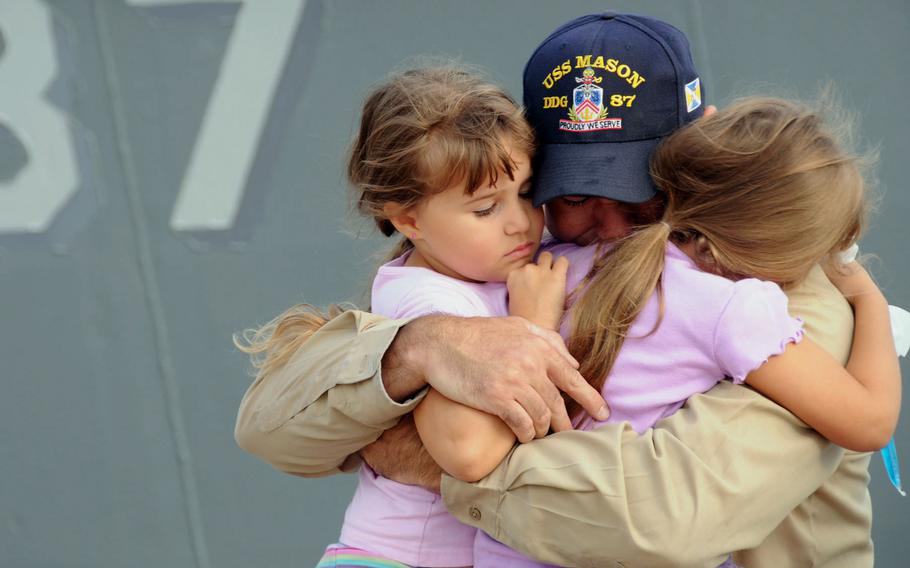
Chief Petty Officer Joseph Stevenson hugs his daughters goodbye before he deploys aboard the destroyer USS Mason. A new Defense Department pilot program offers service members reimbursement for the travel costs associated with having a child care provider at their new duty station. (Tyler J. Wilson/U.S. Navy)
Service members now can be paid back for bringing a children’s caregiver to and from their new assignment location if day care isn’t soon available, the Defense Department announced in a bid to address a struggle many military families experience following a move.
A three-year Defense Department pilot program began Tuesday offering up to $1,500 in reimbursement for transportation costs associated with the travels of someone to look after the kids of service members after a permanent change of station.
“If the scheduling shows that care could not be provided within 30 days of the member’s report date, then the member would become eligible to bring a child care provider to their permanent duty station,” Christopher Woods, chief of the policy branch at the Defense Travel Management Office, said in a Pentagon statement Monday.
Military personnel may seek reimbursement of up to $500 for travel involving PCS assignments in the continental U.S. and up to $1,500 for those elsewhere.
A family member, friend or au pair are among the eligible child care providers whose travel expenses for arrival and departure can be paid back through the program.
The reimbursements are limited to commercial transportation expenses, which include airfare, train tickets, travel to and from an airport, and the cost of renting a car en route to or from the duty station, according to the Defense Department.
Although mileage driven in a personal vehicle isn’t eligible for reimbursement, the cost of gas for personal vehicle travel involving the caregiver can be claimed, the statement said.
“I think this is going to relieve some of the strain and burden that families have as they’re making those PCS transitions,” Heidi Welch, associate director for child and youth programs operations at the Office of the Secretary of Defense, said in the announcement.
More information on child care options is available at the official Military OneSource and Military Child Care websites.
In the 2023 National Defense Authorization Act, Congress called for a pilot program with means to reimburse service members for the costs they incur for military-related moves.
Families often end up on monthslong waitlists for openings at a base Child Development Center, forcing them to turn to off-base solutions that bring extra financial challenges, Kayla Corbitt, founder of the nonprofit group Operation Child Care Project, said in an interview with Naval Services FamilyLine’s Our Navy Life podcast in June.
As of March, 11,500 children were on Child Development Center waitlists, according to DOD data cited in a Sept. 12 letter to Defense Secretary Lloyd Austin signed by Massachusetts Democrat Sen. Elizabeth Warren and Florida Republican Sen. Rick Scott. The letter asked Austin for more details on Pentagon efforts to improve child care resources.
Beyond the pilot program, the department has begun expanding construction of new Child Development Centers, recruiting more workers and reducing on-base child care fees.
However, the system remains strained, especially in heavily populated military locales, a 2023 U.S. Government Accountability Office report said.